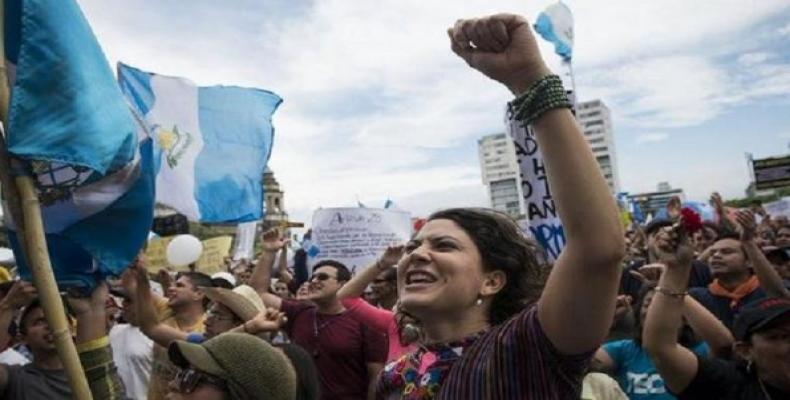Guatemala City, November 9 (RHC)-- As hundreds of organized farmers and union members are blocking highways throughout Guatemala demanding the resignation of President Jimmy Morales, members of the country's Congress are writing a bill outlawing roadblocks as a form of "terrorism."
Protest leader Neftali Lopez said the roadblocks are intended to demand that Morales and all 158 members of Congress step down over alleged acts of corruption. Jimmy Morales is under investigation by the United Nations International Commission Against Impunity in Guatemala, or Cicig, for an unaccounted $825,000 he spent during his 2015 presidential election campaign.
Just as the investigation was taking off, Congress passed several decrees in September that provided Morales with immunity from the CICIG investigation while making it easier for elected officials to evade criminal responsibility for campaign finance fraud. That same month, a government oversight agency found that Morales was receiving “bonuses” from the Guatemalan defense minister that totaled over US$60,000.
Hernandez Azmitia, a member of the congressional commission drafting the bill, said that “a terrorist act doesn’t just include killing someone, it also includes people acting outside of the law who cause damage to private initiatives.” As the currently bill reads, terrorism would include “any type of typical conduct that is outlawed or punishable that incites intimidation, alarm or fear in the population … that threatens the health, liberty, or safety of the people or Nation, or affects public buildings, roadways, communication outlets, or any type of transportation outlet, energy or transmission towers, … or any other public service.”
If the bill is passed into law, those who are found guilty of “impeding the circulation of personal services, gas or products” can face up to 20 or 30 years in prison. Azmitia said with the new law, people still have the constitutional right to protest, but “it’s one thing to protest, but it’s an infraction to cause damage to people or private property,” which she thinks the law could protect against.
Other commission members and social scientists fear the law could criminalize protests. Lawmaker Dorian Taracena, who also serves on the commission, said the bill’s language is too “vague and could be used to interpret protests and strikes as criminal acts.”
Elvyn Diaz, president and director of the Institute of Comparative Studies in Criminal Science of Guatemala, said bringing terrorism into judicial discussions is even more complex in a country that still questions people's right to organize and protest. Diaz added that the text that criminalizes people’s blocking roads or public services borders on unconstitutional.
Edgar Celada, a professor at the University of San Carlos, said there is an intention by lawmakers to “criminalize social protest.” He said sanctions against so-called "terrorists" are “completely disproportionate” to the crime.
The President of the Committee for Agriculture, Business, Industry and Finances, Antonio Malouf, sites the roadblocks as a reason to have the law, to penalize those who “didn't allow the free circulation of traffic,” saying these acts were unconstitutional.
Guatemalan Protesters Block Highways Demanding President Jimmy Morales Resign

Related Articles
Commentaries
MAKE A COMMENT
All fields requiredMore Views
- New York doctor fired for rejecting Zionist propaganda, defending resistance
- Artistic swimmers prepare for continental competition
- Russian minister says BRICS to establish digital payment system for members
- President Nicolas Maduro rejects Marco Rubio's threats against Venezuela
- Ibero-American Criminal Sciences event comes to a close in Cuba

